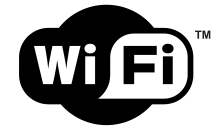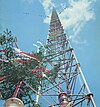
Back Wi-Fi AF واي فاي Arabic واى فاى ARZ ৱাই-ফাই AS Wifi AST Wi-Fi AZ Wi-Fi BA Wi-Fi BCL Wi-Fi BE Wi-Fi BE-X-OLD
 | |
| Introduced | 21 September 1997 |
|---|---|
| Compatible hardware | Personal computers, gaming consoles, smart devices, televisions, printers, security cameras |
| Part of a series on |
| Antennas |
|---|
 |
Wi-Fi (/ˈwaɪfaɪ/)[1][a] is a family of wireless network protocols based on the IEEE 802.11 family of standards, which are commonly used for local area networking of devices and Internet access, allowing nearby digital devices to exchange data by radio waves. These are the most widely used computer networks, used globally in home and small office networks to link devices and to provide Internet access with wireless routers and wireless access points in public places such as coffee shops, restaurants, hotels, libraries, and airports.
Wi-Fi is a trademark of the Wi-Fi Alliance, which restricts the use of the term "Wi-Fi Certified" to products that successfully complete interoperability certification testing.[3][4][5] Non-compliant hardware is simply referred to as WLAN, and it may or may not work with "Wi-Fi Certified" devices. As of 2017,[update] the Wi-Fi Alliance consisted of more than 800 companies from around the world.[6] As of 2019,[update] over 3.05 billion Wi-Fi-enabled devices are shipped globally each year.[7]
Wi-Fi uses multiple parts of the IEEE 802 protocol family and is designed to work well with its wired sibling, Ethernet. Compatible devices can network through wireless access points with each other as well as with wired devices and the Internet. Different versions of Wi-Fi are specified by various IEEE 802.11 protocol standards, with different radio technologies determining radio bands, maximum ranges, and speeds that may be achieved. Wi-Fi most commonly uses the 2.4 gigahertz (120 mm) UHF and 5 gigahertz (60 mm) SHF radio bands, with the 6 gigahertz SHF band used in newer generations of the standard; these bands are subdivided into multiple channels. Channels can be shared between networks, but, within range, only one transmitter can transmit on a channel at a time.

Wi-Fi's radio bands work best for line-of-sight use. Many common obstructions, such as walls, pillars, home appliances, etc., may greatly reduce range, but this also helps minimize interference between different networks in crowded environments. The range of an access point is about 20 m (66 ft) indoors, while some access points claim up to a 150 m (490 ft) range outdoors. Hotspot coverage can be as small as a single room with walls that block radio waves or as large as many square kilometers using many overlapping access points with roaming permitted between them. Over time, the speed and spectral efficiency of Wi-Fi have increased. As of 2019,[update] some versions of Wi-Fi, running on suitable hardware at close range, can achieve speeds of 9.6 Gbit/s (gigabit per second).[8]
- ^ Garber, Megan (23 June 2014). "'Why-Fi' or 'Wiffy'? How Americans Pronounce Common Tech Terms". The Atlantic. Archived from the original on 15 June 2018.
- ^ "What Does Wi-Fi Stand For?". Archived from the original on 5 January 2022. Retrieved 7 January 2022.
- ^ Beal, Vangie (2 May 2001). "What is Wi-Fi (IEEE 802.11x)? A Webopedia Definition". Webopedia. Archived from the original on 8 March 2012.
- ^ Schofield, Jack (21 May 2007). "The Dangers of Wi-Fi Radiation (Updated)". The Guardian. Archived from the original on 1 November 2019. Retrieved 1 November 2019 – via TheGuardian.com.
- ^ "Certification". Wi-Fi.org. Wi-Fi Alliance. Archived from the original on 13 May 2020. Retrieved 1 November 2019.
- ^ "History | Wi-Fi Alliance". Wi-Fi Alliance. Archived from the original on 24 October 2017. Retrieved 15 September 2020.
- ^ Cite error: The named reference
global-forecastwas invoked but never defined (see the help page). - ^ "Wi-Fi 6: is it really that much faster?". 21 February 2019. Archived from the original on 20 September 2022. Retrieved 18 September 2022.
Cite error: There are <ref group=lower-alpha> tags or {{efn}} templates on this page, but the references will not show without a {{reflist|group=lower-alpha}} template or {{notelist}} template (see the help page).